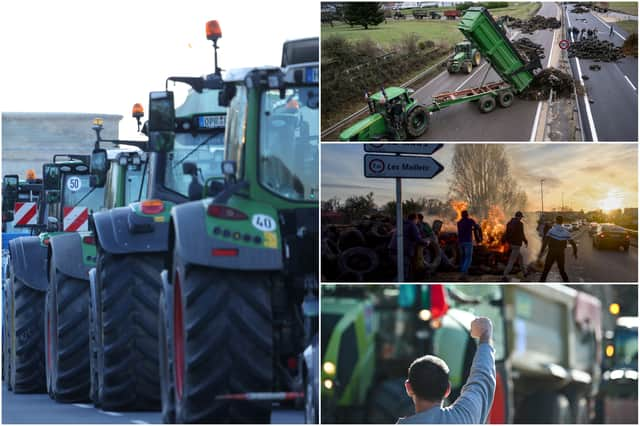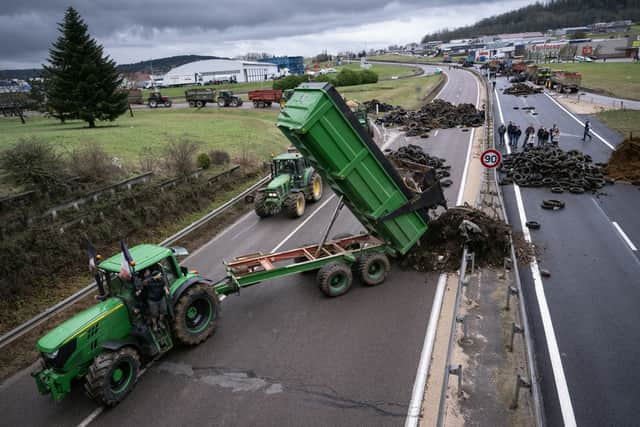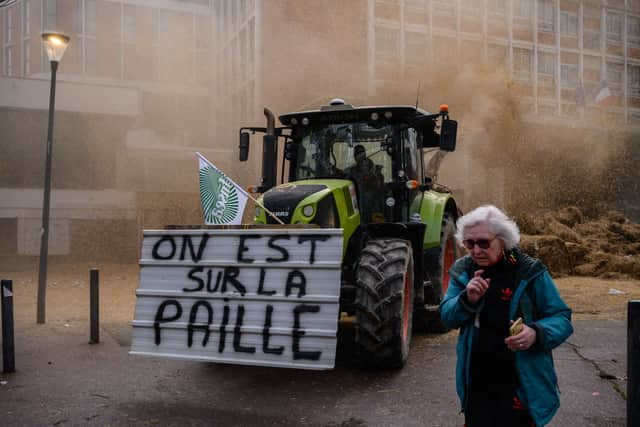Farmers protest: why are French farmers protesting, France, Paris, EU and Europe 2024 farmers strike explained


French farmers have begun to dismantle roadblocks in Paris and other parts of the country following the French government's announcement of over 400 million euros (£341 million) in measures aimed at addressing their concerns.
On Friday (2 February), protesters along major highways near Paris removed tents, cleared roads and set fire to straw bales that had been used as barricades.
Advertisement
Hide AdAdvertisement
Hide AdConvoying tractors left the protest sites in an orderly fashion, accompanied by a substantial police presence to safeguard the proceedings.
It was a far cry from scenes seen just a day before in Brussels, where farmers threw eggs and fireworks at police as thick smoke hung in the air and security forces used water cannons to douse fires and keep a farmer from felling a tree on the steps of the European Parliament.
For weeks, farmers across the continent have mounted a coordinated protest effort. In Greece, farmers rallied outside an agricultural fair, while others drove their tractors into Milan, Italy.
The protests have jammed traffic in cities, preventing millions of European citizens from getting to work or school, while blockades of ports and major traffic routes have meant supermarket shelves have been left bare.
Advertisement
Hide AdAdvertisement
Hide AdHungarian Prime Minister Viktor Orban even complained that the endless noise from the tractors kept him up at night. But why exactly are the farmers protesting, and what are their demands? Here is everything you need to know.
What's happening?


Protests began in France on 16 January, with a demonstration in Toulouse which had little impact. Farmers then decided to block the A64 motorway on 18 January, and the movement grew from there.
By 22 January, the protests had spread to other countries, with Polish farmers and truckers blockading border crossings, causing back-ups and threatening the flow of some aid going into Ukraine.
On 23 January, a woman was killed and her husband and daughter injured in a traffic collision at a barricade at a French protest when a car ploughed into straw bales that demonstrators had placed across a road, hitting the three people before it came to a stop against a tractor’s semi-trailer.
Advertisement
Hide AdAdvertisement
Hide AdThe French protests - which included dumps of agricultural waste outside government offices and other demonstrations - then began to creep closer to Paris, with tractors driving in convoys and blocking roads in many regions to ratchet up pressure.
France’s interior ministry ordered a large deployment of security forces around Paris on 28 January as angry farmers threatened to head toward the capital, and climate activists hurled soup at the glass protecting the Mona Lisa at the Louvre Museum.
By 29 January, protesting farmers were encircling Paris with tractor barricades and drive-slows, using their vehicles to block motorways leading to France’s capital. Jeremy Clarkson then wrote a message of support for the farmers, wishing them “good luck” in a message posted to X, formerly known as Twitter, on 31 January.
The next day, convoys with hundreds of angry farmers driving heavy-duty tractors advanced toward European Union headquarters, bent on having their complaints heard by EU leaders at a summit.
Advertisement
Hide AdAdvertisement
Hide AdWhy are farmers protesting?


The farmers are unhappy over low earnings, heavy regulation and unfair competition from abroad.
For weeks, they have complained that it is becoming harder than ever to make a decent living as energy and fertiliser costs surge because of Russia’s war in Ukraine, more and cheaper farm imports enter the bloc, and climate change-fuelled droughts, floods or fires destroy crops.
What's being done to stop the protests?
In France, the government has offered more than 400 million euros (£341 million) in various measures meant to answer the farmers' grievances.
They included hundreds of millions of euros in aid, tax breaks and a promise not to ban pesticides in France that are allowed elsewhere in Europe – which French farmers say leads to unfair competition.
Advertisement
Hide AdAdvertisement
Hide AdOn Thursday (1 February), Prime Minister Gabriel Attal, whose earlier promises to address farmers’ issues failed to quell the protests, announced 150 million euros (£128 million) in aid to livestock farmers and a decrease in taxes on farms being transferred from older generations to younger ones, as well as 80 million euros (£68 million) in emergency aid to struggling wine producers.
Arnaud Rousseau, the president of the biggest farmers’ union, FNSEA, speaking on news broadcaster BFM, said “we now want to work” on the government’s proposals and take “concrete” steps within the next few weeks.
Rousseau said farmers would keep a close eye on whether the government implements its promises by June, and warned that they are ready to protest again as the country gets ready for the Paris Olympics this summer.
In terms of the wider picture, beyond France, the European Commission plans to shield farmers from cheap imports from Ukraine during wartime and allow farmers to use some land that had been forced to lie fallow for environmental reasons.
Advertisement
Hide AdAdvertisement
Hide AdEC chief Ursula von der Leyen also promised to prepare by the end of the month new plans to cut reams of bureaucratic rules to make sure farmers can spend more time in their fields, not in their offices.
In Brussels, many leaders also said they would not approve a mooted trade deal with South American nations unless any imports meet the same regulatory standards faced by EU farmers, a key demand from the sector.
Comment Guidelines
National World encourages reader discussion on our stories. User feedback, insights and back-and-forth exchanges add a rich layer of context to reporting. Please review our Community Guidelines before commenting.
